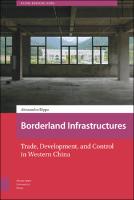Borderland Infrastructures
Trade, Development, and Control in Western China
Author(s)
Rippa, Alessandro
Contributor(s)
Schendel, Willem van (other)
Harris, Tina (other)
Language
EnglishAbstract
Across the Chinese borderlands, investments in large-scale transnational infrastructure such as roads and special economic zones have increased exponentially over the past two decades. Based on long-term ethnographic research, Borderland Infrastructures addresses a major contradiction at the heart of this fast-paced development: small-scale traders have lost their historic strategic advantages under the growth of massive Chinese state investment and are now struggling to keep their businesses afloat. Concurrently, local ethnic minorities have become the target of radical resettlement projects, securitization, and tourism initiatives, and have in many cases grown increasingly dependent on state subsidies. At the juncture of anthropological explorations of the state, border studies, and research on transnational trade and infrastructure development, Borderland Infrastructures provides new analytical tools to understand how state power is experienced, mediated, and enacted in Xinjiang and Yunnan. In the process, Rippa offers a rich and nuanced ethnography of life across China’s peripheries.
Keywords
China; Border studies; Anthropology; Infrastructure; Belt and Road Initiative.Publisher
Amsterdam University PressPublisher website
https://www.aup.nl/Publication date and place
2020Imprint
Amsterdam University PressSeries
Asian Borderlands,Classification
Geopolitics
Anthropology
China
International trade and commerce


 Download
Download Web Shop
Web Shop